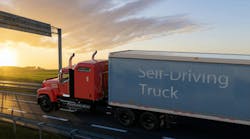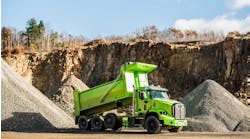Aurora Innovation released a white paper indicating that autonomous trucking has the potential for significant environmental benefits. The paper finds that autonomous trucking could increase energy efficiency by up to 32% relative to traditional trucking, helping the freight and logistics industry reduce emissions, meet environmental regulatory mandates, and bring down operating costs.
Transportation is a significant source of emissions
Transportation makes up approximately 29% of greenhouse gas emissions in the U.S. and, of this, medium- and heavy-duty trucks account for 23%. In some freight-heavy states, this number is even greater—transportation causes approximately 50% of greenhouse gas emissions in California.
Autonomous trucking technology can help fight climate change
There is a need for new technologies that reduce freight transportation’s negative impact on climate change. As Aurora advances toward driverless commercial operations, the company has examined ways to maximize the environmental benefits of autonomous trucks. The white paper identifies seven opportunities to use autonomous trucking to make freight transportation more energy efficient, including:
- Optimizing highway speeds: Autonomous trucks are not limited by hours-of-service restrictions, meaning there is less incentive to drive at high speeds to reach their destination faster. This enables lower-speed driving that consumes less fuel per mile. Aurora’s approach of driving 65 mph instead of 70-75 mph on the highway could reduce highway fuel consumption by 9%-17%.
- Limiting idling: Today’s trucks often consume fuel by idling when drivers take breaks to rest, eat, or relax between hauls. This represents 4%-9% of fuel consumption. While autonomous trucks cannot completely eliminate idling, they could better maximize driving time.
- Eco-driving: Significant automotive energy usage comes from inefficient acceleration and braking. Autonomous trucks are capable of eco-driving—strategically optimizing acceleration, braking, and coasting to increase energy efficiency and reduce fuel consumption. One study cited in the white paper found increased strategic coasting could lead to 9.5% fuel savings.
- Traffic reduction: Because autonomous trucks can operate nearly 24 hours per day, they can shift a greater proportion of freight to off-peak driving hours. Not only would this reduce autonomous trucks’ fuel consumption by decreasing time stuck in traffic, shifting a portion of truck traffic to off-peak hours would help reduce congestion and fuel consumption for other vehicles.
See also: Hirschbach, Aurora pilot autonomous reefer truck
Additionally, the white paper explains how the introduction of autonomous trucks into the supply chain can be a longer-term catalyst for accelerated adoption of next-generation powertrains, like battery electric and hydrogen fuel cell platforms, given the following:
- Faster return on investment: New powertrains will likely have higher upfront costs, and the lower operating costs and higher utilization of autonomous trucks could enable faster returns on those investments.
- Better range management: Because autonomous trucks are not restricted by hours-of-service limitations, they can better manage range and charging/fueling limitations of next-generation platforms.
- Fixed routes: The fixed route model of deploying autonomous trucks supports focused installation of charging/fueling infrastructure along these routes.
Safe, efficient, and sustainable autonomous trucks
“As autonomous trucks make hauling freight safer, we have a responsibility to make logistics more sustainable as well. Self-driving technology can fight climate change by increasing energy efficiency and reducing emissions in the supply chain,” said Garrett Bray, the author of the white paper and a product director at Aurora.
For carriers, autonomous trucks’ more efficient fuel consumption could reduce operating costs, and reductions in emissions would help meet federal and state environmental regulatory mandates.



